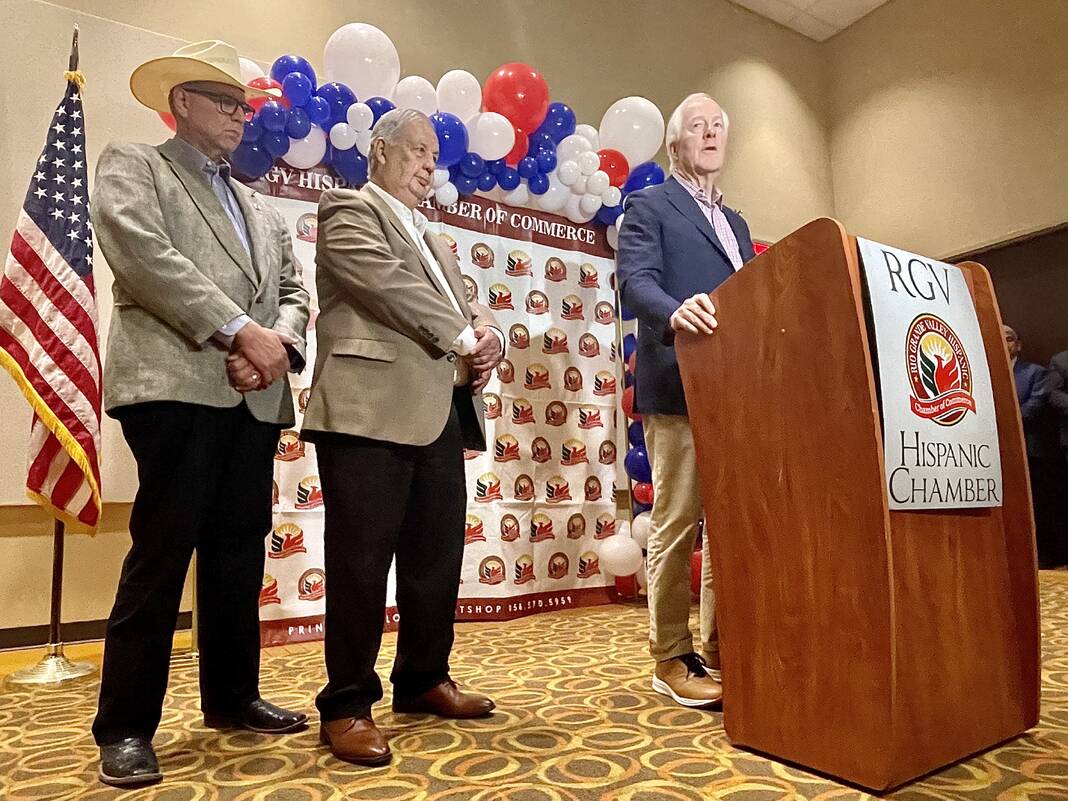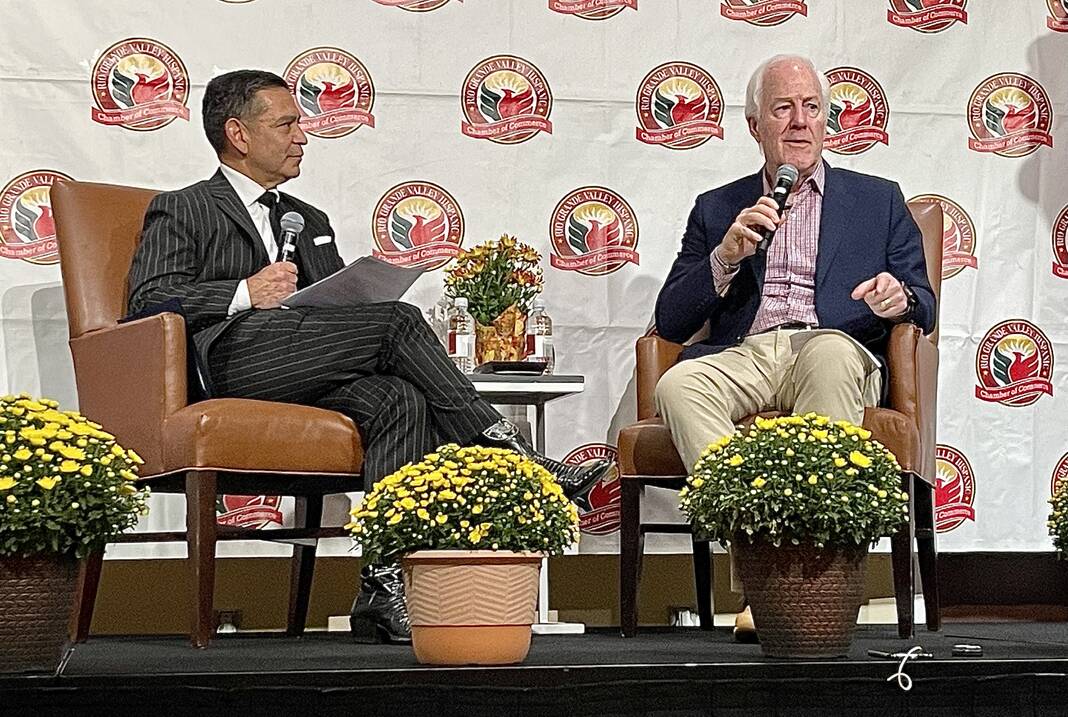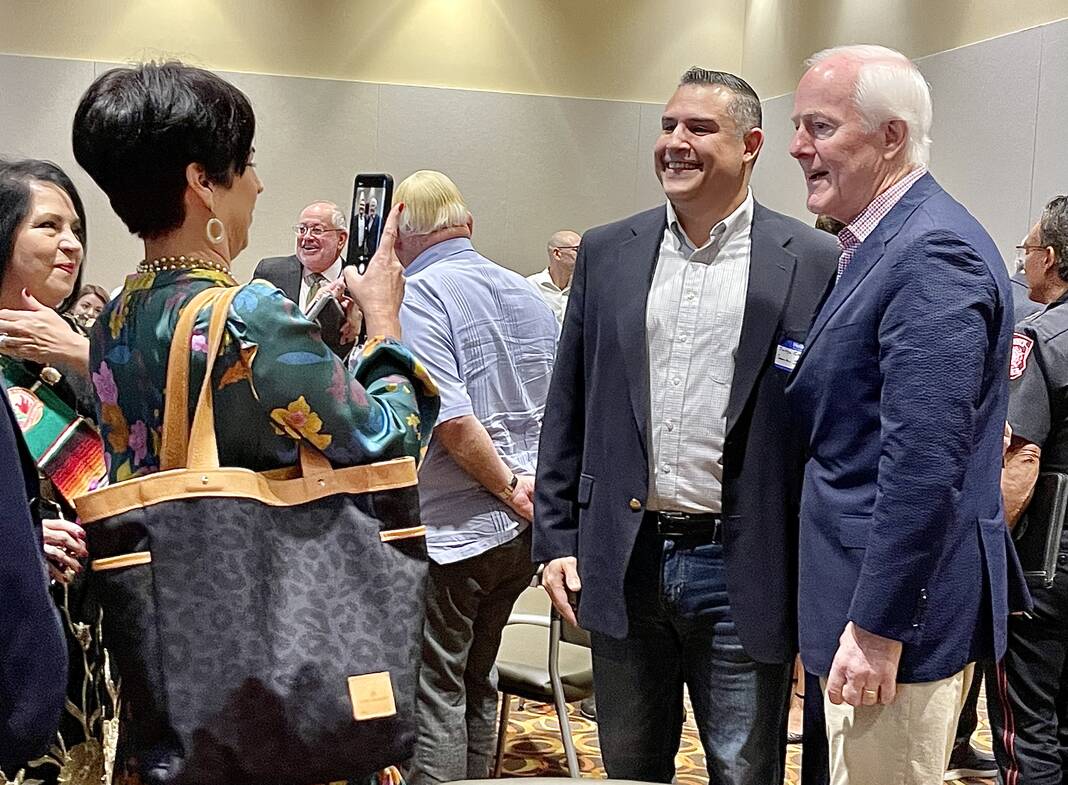|
Only have a minute? Listen instead
Getting your Trinity Audio player ready...
|

EDINBURG — The Rio Grande Valley — and the binational border that defines it — is a place not well understood by outsiders, despite its steady place in national headlines.
It’s a region that’s critical to not only national security, but the nation’s commerce, according to U.S. Sen. John Cornyn, who spoke during a luncheon hosted by the Hispanic Chamber of Commerce here on Monday.
For Texas’ senior Republican senator, it’s important for his fellow lawmakers to understand the pivotal role the Valley plays in the success of the country at large, while not getting mired down by cable news sound bites.
“One of the reasons why I have invited a number of my colleagues to come to the Valley and to the border, in particular, is because you hear some pretty crazy things when people talk about the border,” Cornyn said.
“Occasionally, I’ll hear senators from other states say, ‘We need to seal the border.’ Well, I always ask them, ‘Do you know how many jobs are created in the United States based on binational trade with Mexico?” he continued.
The comment elicited a round of applause from the audience, many of whom represented some of the Valley’s biggest industries, including international ports, hospital systems, higher education, the oil and gas industry, and more.
Things are not so black and white. And Cornyn wants Washington policymakers to understand that.
The senator explained how he has worked to dispel the all-or-nothing narratives about the border — from the idea that a border wall is a one-size-fits-all solution to border security, to immigration as a zero-sum game.
In regard to immigration, the senator called legal immigration an “unequivocal blessing” that has “allowed the best and brightest, the hardest working people in the world to come to our country and seek a better life.”
But, he cautioned that illegal immigration threatens not only border security, but international commerce, as well.
“Hordes of people coming across the border not only interferes with the ability to detect and interdict illegal drugs that are coming across the border, it also has the tendency to overwhelm legitimate trade and travel,” Cornyn said, which he called the “lifeblood” of border communities.

Earlier this year, the flow of that lifeblood was halted at one Valley port of entry.
Just as Title 42 was set to expire this April, a group of more than 1,000 migrants attempted to cross the Gateway International Bridge in Brownsville. The sudden press of migrants forced U.S. Customs and Border Protection agents to temporarily shut the bridge down.
More recently, other migrant influxes have forced the temporary closures at bridges in Eagle Pass and El Paso as they have either become overwhelmed, or as officials have had to redeploy assets to deal with an increase in migrant crossings elsewhere.
Cornyn said he’s doing his best to listen to local stakeholders as the situation evolves, so he can better relay Texas’ border needs to his congressional colleagues: “What I call the forward operating base in hostile territory known as Washington D.C.,” Cornyn said.
Beyond that, he has also led a delegation of lawmakers to Mexico to speak with the highest echelons of government there.
“I took a bipartisan, bicameral delegation of House and Senate members down to Mexico City to visit with President (Andrés Manuel) Lopez Obrador, which was quite a unique experience,” Cornyn said.
There, he tried to impress upon the Mexican president the vital role that his country can play in growing trade throughout not only Mexico, but the entirety of North America.
“Unfortunately, Mexico, because of the challenges it faces, is not able to live up to its potential. It could be a booming place,” Cornyn said, alluding to the stranglehold that Mexican drug cartels have on the country.
“Because of organized crime and everything that goes along with it, it’s not living up to that potential,” he added.
Throughout his comments Monday, Cornyn criticized the heavy influence that Mexican cartels have there — whether it’s their impact on Mexico’s ability to prosper, or how the cartels’ drug and human trafficking places an undue burden here in the U.S.
And that brought the senator back to border security — specifically, to the efficacy of the border wall.
Cornyn called border security a “three-legged stool” made up of technology, people and infrastructure. Depending on any one of those variables to the exclusion of the others will lead to failure.
“You can’t just put up a piece of infrastructure and expect … the border to be safe or control the flow of people and drugs coming into the country,” Cornyn said.
“It’s a huge topic, but it’s also one that I think it’s really important… to invite our colleagues to come down here and see it for themselves,” he said.

Cornyn later elaborated on the topic during a question-and-answer session with the media shortly after the luncheon.
In particular, Cornyn joined a swath of Democratic lawmakers who have called into question a recent decision by Homeland Security Secretary Alejandro Mayorkas to authorize the construction of 17 new miles of border wall in rural Starr County.
Mayorkas issued the authorization last Thursday, waiving 26 environmental laws in the process.
“I have no idea whether this new construction actually makes any sense,” Cornyn told reporters.
Mayorkas cited an increasing number of migrant crossings as justification for the construction authorization; however, CBP’s own data show that Starr County has not been a migrant crossing hot spot for months.
Cornyn said it was an issue he planned on bringing up with Gloria Chavez, Border Patrol chief of the Rio Grande Valley Sector.
“That’s something I’d like to talk to her about. … Is this just for show? Or is this actually designed to solve any problems? Because I just don’t know the answer to that,” Cornyn said.
As with nearly everything else related to the U.S.-Mexico border, it’s an issue that cannot be easily reduced down in simple terms.
“I mean, this is more nuanced and more complex than I think some of the folks in Washington D.C. understand,” Cornyn said.




